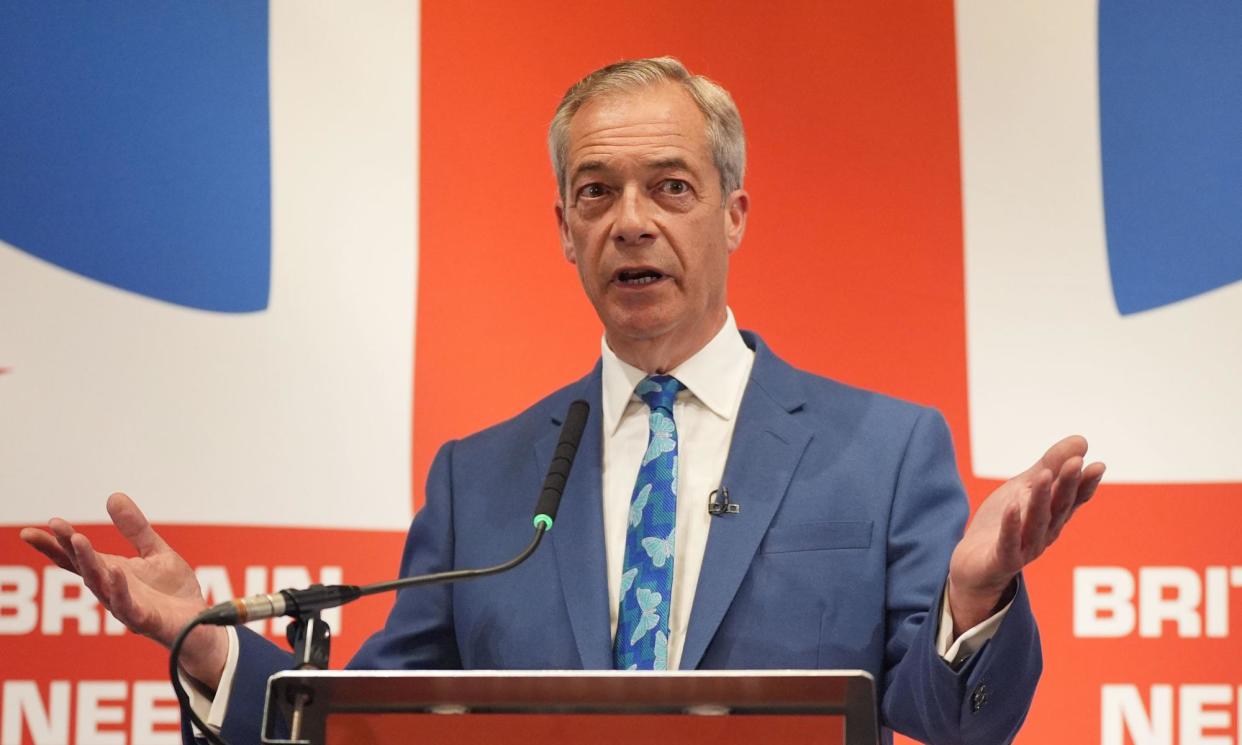Reality check: how do Farage’s claims on immigration, economy and crime hold up?

Nigel Farage announced his decision to stand for parliament in a typically colourful speech in which he made several eye-catching claims. How many of these were accurate?
Have 2.4 million people settled in the UK in the last two years?
Essentially, no, this is false. Official statistics showed that 1.2 million people arrived in the UK in the year ending December 2023, which projected over two years makes 2.4 million, but it is incorrect to say they have all “settled”. Many will have arrived on temporary visas, for example students and workers on contracts.
The standard measure is net migration – the number of arrivals minus the number of departures. This figure was 685,000 in the year to December 2023 and 764,000 in year the previous year, and is likely to be lower in 2024.
Do we need to ‘build a new house every two minutes’ to accommodate legal migrants?
It is not entirely clear what this statistic relates to. This rate would be slightly more than 260,000 homes a year, equating to about 2.6 people per house based on current net migration, which is slightly higher than the average UK household occupancy.
So it is not quite as misleading as the 2.4 million claim – although it doesn’t take account that the UK’s housing crisis is a question of distribution as well as supply, with an estimated 700,000 homes empty at any one time.
Did a series of local election candidates yell ‘Allahu Akbar’?
Farage told the audience: “We are finding what happened after the local elections just a few weeks ago, candidates winning in Leeds, in Burnley, in Bradford and elsewhere, standing shouting ‘Allahu Akbar’, standing shouting ‘we are coming to get you’.”
This appears to be false in two areas. One Green candidate in Leeds, Mothin Ali, did shout “Allahu Akbar” after he won, also saying: “We will not be silent … This is a win for the people of Gaza.” Ali later apologised for his Gaza comments while pointing out that “Allahu Akbar” is commonly used by Muslims as a celebratory term.
However, there is no evidence of this happening in Burnley or Bradford, two areas that Farage may have named because they have large Muslim populations. There is also no evidence of a candidate saying “we are coming to get you”.
Is the UK doing better economically than EU members?
Saying the UK was “in economic decline in relative terms”, Farage added: “OK, better than our former partners in the European Union – we’re massively behind America and many other parts of the world.”
This is a claim also made by some Conservative politicians but is at best a very selective presentation of the facts. The UK’s quarter-on-quarter GDP growth was 0.6% for the first three months of 2024, compared with 0.3% for the eurozone. But in a year-on-year comparison the eurozone grew more quickly – 0.4% against the UK’s 0.2%.
And if you take the longer term, comparing the first quarter of 2024 against the pre-Covid first quarter of 2019, eurozone growth has been twice as fast – 3.4% against 1.7%.
Can you shoplift £200 of goods without being prosecuted?
Farage said crime was “so bad now that people generally don’t even bother to report it”, adding: “But it’s OK, you can shoplift up to £200 of kit before anybody is going to prosecute you.”
This could be put down as just a rhetorical flourish but it is not true. While many stores are concerned that shoplifting has become worse, there are numerous news stories about people being prosecuted for stealing less than £200 worth of goods.
Did Keir Starmer fight ‘very, very hard’ for asylum seekers to get benefits?
Farage said the Labour leader “fought very, very hard for those that arrive on the back of lorries to get benefits once they got here”. This is misleading.
It is an apparent reference to a 2003 legal case in which Starmer, then a leading barrister, represented five asylum seekers denied financial support and won the case. However, this was not a generalised case for all asylum seekers. And nor was it about “benefits” in the usual sense of the word – it was about a group of people denied the very basic support, including accommodation, still given to asylum seekers.

 Yahoo News
Yahoo News 
